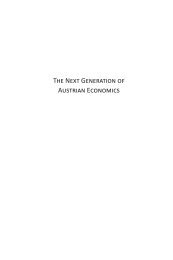capitalist_and_entrepreneur_klein
capitalist_and_entrepreneur_klein
capitalist_and_entrepreneur_klein
You also want an ePaper? Increase the reach of your titles
YUMPU automatically turns print PDFs into web optimized ePapers that Google loves.
30 <br />
failure to discover an existing profit opportunity. Entrepreneurs either earn<br />
profits or break even, but it is unclear how they suffer losses. 8<br />
Mises, by contrast, consistently identifies <strong>entrepreneur</strong>ship with both<br />
profit <strong>and</strong> loss. “ere is a simple rule of thumb to tell <strong>entrepreneur</strong>s<br />
from non-<strong>entrepreneur</strong>s. e <strong>entrepreneur</strong>s are those on whom the incidence<br />
of losses on the capital employed falls” (Mises, 1951, p. 112). Moreover,<br />
while Mises indeed acknowledges the element of <strong>entrepreneur</strong>ship<br />
in all human action, it is clear that the potential losses of the <strong>capitalist</strong><strong>entrepreneur</strong>s<br />
are particularly important:<br />
Mises applies the concept of the <strong>entrepreneur</strong> to all cases of uncertainty-bearing,<br />
<strong>and</strong> since laborers face uncertainty in deciding<br />
where to move or what occupation to go into, laborers are also<br />
<strong>entrepreneur</strong>s. But the most important case of <strong>entrepreneur</strong>ship,<br />
the driving force in shaping the actual structure <strong>and</strong> patterns of production<br />
in the market economy, are the <strong>capitalist</strong>-<strong>entrepreneur</strong>s,<br />
the ones who commit <strong>and</strong> risk their capital in deciding when, what,<br />
<strong>and</strong> how much to produce. e <strong>capitalist</strong>s, too, are far more subject<br />
to actual monetary losses than are the laborers. (Rothbard, 1985,<br />
p. 282) 9<br />
Mises is careful to distinguish <strong>entrepreneur</strong>ship from management,<br />
the carrying out of those tasks specified by the <strong>capitalist</strong>-<strong>entrepreneur</strong>.<br />
“[T]hose who confuse <strong>entrepreneur</strong>ship <strong>and</strong> management close their eyes<br />
to the economic problem” (Mises, 1949, p. 704). It is the <strong>capitalist</strong>-<strong>entrepreneur</strong>s<br />
who control the allocation of capital to the various branches of<br />
industry.<br />
It is clear from this formulation that the <strong>capitalist</strong>-<strong>entrepreneur</strong> must<br />
own property. He cannot invest without prior ownership of financial<br />
capital. (1871, pp. 159–61) treatment of production includes as <strong>entrepreneur</strong>ial<br />
functions economic calculation, the “act of will,” <strong>and</strong> “supervision<br />
of the execution of the production plan.” ese functions “entail property<br />
ownership <strong>and</strong>, therefore, mark the Mengerian <strong>entrepreneur</strong> as a <strong>capitalist</strong><strong>entrepreneur</strong>”<br />
(Salerno, 1999a, p. 30). Menger describes “comm<strong>and</strong> of the<br />
services of capital” as a “necessary prerequisite” for economic activity. Even<br />
in large firms, although he may employ “several helpers,” the <strong>entrepreneur</strong><br />
himself continues to bear uncertainty, perform economic calculation, <strong>and</strong><br />
8 See chapter 5 below for further discussion of this point.<br />
9 Of course, bondholders, as well as equity holders, are partly <strong>entrepreneur</strong>s, since even<br />
bondholders bear some default risk.








